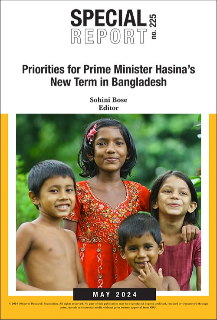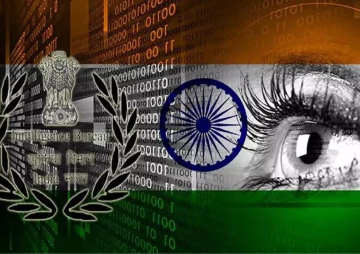Introduction
Bangladesh Prime Minister Sheikh Hasina’s Awami League government was re-elected to power for the fourth consecutive time at the 12th parliamentary election in January 2024. PM Hasina returned to power amid US pressures to influence the elections through multiple means, including imposing visa restrictions on Bangladeshi citizens allegedly involved in compromising the polls;[1] not inviting Bangladesh to the Democracy Summits;[2] US Ambassador to Bangladesh, Peter Haas’s meeting with the families of the victims of ‘enforced displacements’, including the BNP leader, Sajedul Islam Sumon;[3] and the imposition of sanctions on officials of Bangladesh’s Rapid Action Battalion for reported human rights abuses.[4]
Hasina’s victory may be a testament to the government’s deft handling of global-power politics. At the same time, however, the boycott of the polls by the main opposition party, the Bangladesh Nationalist Party (BNP),[5] and the low 40 percent voter turnout on election day,[6] raise serious questions about the country’s domestic politics and the resilience of successive leadership.
On the economic front, Bangladesh is aiming to graduate from its Least Developed Country (LDC) status by 2026,[7] although persistent challenges are threatening to delay progress. Neighbourhood relations also demand consideration. While multifaceted cooperation has led to stronger bilateral ties, the Rohingya crisis continues unresolved. Curbing challenges to human security, such as climate change, has emerged as a critical aspect of bilateral and multilateral ties between Bangladesh and its neighbours. Defence is also an emerging area of cooperation between Dhaka and its Indo-Pacific partners, with Bangladesh having to reconcile its reported dissatisfaction with the Chinese manufacture of arms with its need for modern weaponry in line with its ‘Forces Goal 2030’.[8]
In the wider Indo-Pacific, Bangladesh, having released its Indo-Pacific Outlook in 2023,[9] is keen on playing a bigger role in shaping the geopolitical dynamics in the region. While maximising its economic benefits and carving a niche for itself in global issues remains on the agenda, maintaining balance in its diplomatic relations is becoming increasingly challenging, with global powers vying for its support.
This special report deliberates on the challenges, opportunities, and priorities that will define Bangladesh’s governance in the next five years. It brings together six analysts from India and Bangladesh who examine crucial areas for Prime Minister Hasina’s administration: domestic politics; economic strategies; neighbourhood ties; engagement with global powers; defence initiatives; and climate change. The chapters outline key challenges in these domains and highlight priorities for the new government.
In the first essay, Khondaker Golam Moazzem notes how, in the last 15 years, under the Awami League regime, Bangladesh has recorded a largely positive macroeconomic performance. Bangladesh has experienced impressive economic growth, driven by the ready-made garments industry, even as it has faced challenges such as high inflation and a decline in remittances. These challenges, compounded by other political and social concerns, have created an uncertain macroeconomic scenario that has kept investors at bay. Prompt and time-bound reforms in line with electoral promises are necessary to ensure the country’s economic growth, especially vis-à-vis its target of attaining upper-middle-income status by 2031.
Examining the current domestic political challenges, Pallab Bhattacharya, in his contribution, argues that the real political challenge for Bangladesh involves arriving at an acceptable template for holding the elections towards the consolidation of democracy. At present, parliamentary democracy in Dhaka is marked by deep mutual distrust and suspicions between rival political parties that do not help in fostering a healthy democratic culture. Mitigating this challenge will require the insulation of constitutional bodies from political pressure and the fostering of an environment that allows expressing dissent. The opposition also needs to play a more participatory role in politics.
The Hasina administration has directed its attention to strengthening relationships with neighbouring nations, particularly India—a commitment that was underscored by PM Hasina recognising India as a “great friend” the day after her 2024 election victory.[10] Riya Sinha analyses India-Bangladesh ties in her chapter, and explores how Bangladesh’s relationship with India can be advanced by forging stronger economic links through hard and soft connectivity initiatives.
Alongside its relations with India, a key facet of Bangladesh’s foreign policy is its relations with major powers such as the United States, China, Russia, Japan, and the European Union. In his piece, Niloy Ranjan Biswas highlights a crucial task for the Bangladesh government: striking a pragmatic equilibrium between key foreign stakeholders who have divergent or conflicting expectations. This entails adeptly exercising foreign policy autonomy to drive necessary changes in alignment with national interests while navigating the cooperative or competing demands of the global powers.
In the domain of defence, Kallol Bhattacherjee, in his article, underlines that a critical challenge for PM Hasina in her new term is revising the strategic posture of Bangladesh’s armed forces. As clashes between the Myanmar Army and the Arakan Army along the Bangladesh-Myanmar border intensify, there is greater possibility of the conflict spilling into Bangladeshi territory. It thus becomes more important to equip Bangladesh’s armed forces with better deterrence capabilities. At the same time, Bangladesh needs to diversify its sources of defence equipment, given its apparent dissatisfaction with the Chinese supply, while carefully navigating the unfolding geopolitical dynamics.
Finally, climate change has emerged as a massive non-traditional security concern for Bangladesh, finding a place in its Indo-Pacific Outlook as an arena for transboundary cooperation.[11] Anasua Basu Ray Chaudhury assesses the country’s physical vulnerabilities to cyclones, flooding, and sea-level rise, highlighting not only the susceptibility of the coastal areas but the often overlooked gendered nature of the impacts. She emphasises that the Bangladesh government must prioritise community-led and -managed mechanisms for disaster risk management and for dealing with the ramifications of climate change.
Read the report here.
Endnotes
[1] Government of the United States, “Announcement of Visa Policy to Promote Democratic Elections in Bangladesh,” U.S. Embassy in Bangladesh, May 24, 2023.
[2] “Bangladesh Left Out of US Democracy Summit Again,” The Daily Star, February 15, 2023.
[3] “Peter Haas Meets Families of Victims of Enforced Disappearance,” The Daily Star, December 14, 2022.
[4] Ali Riyaz, “US Sanctions on Bangladesh’s RAB: What Happened? What’s Next?” Atlantic Council, December 16, 2021.
[5] “Bangladesh Goes to Poll Amid Boycott by Main Opposition BNP,” The Hindu Business Line, January 7, 2024.
[6] “Turnout Around 40 Percent: CEC,” The Daily Star, January 7, 2024.
[7] United Nations, “Bangladesh Graduation Status,” LDC Portal - International Support Measures for Least Developed Countries.
[8] Iqram Hossain Mahboob, “Forces Goal 2030: Geopolitical Significance for Bangladesh and the Region,” BIPSS Commentary, May 2023.
[9] Ministry of Foreign Affairs, Government of Bangladesh.
[10] Indrajit Kundu, “‘Gave Shelter to Me and Family’: Sheikh Hasina Calls India ‘Great Friend’ After Poll Win,” India Today, January 8, 2024.
[11] Ministry of Foreign Affairs, Government of Bangladesh.
The views expressed above belong to the author(s). ORF research and analyses now available on Telegram! Click here to access our curated content — blogs, longforms and interviews.

 PDF Download
PDF Download



 PREV
PREV


